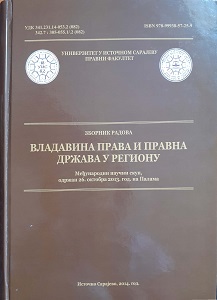Зачеци правне државе у устаничкој Србији
The Beginnings of the Rule of Law in Serbia During the First Uprising (1804-1813)
Author(s): Srđan Šarkić
Subject(s): History of Law, 19th Century
Published by: Правни факултет Универзитета у Источном Сарајеву
Keywords: Teodor Filipović (Boža Grujović);Council or Government;Rule of law;Liberty;Justice;"Paulucci Convention";Contstitution;"Karađorđe Law Code"
Summary/Abstract: Alongside the struggle for independence, the First Serbian uprising signified the beginning of the formation of the Serbian state and overthrow of the feudal order. This fact was already remarked by Leopold von Ranke in his book Die serbische Revolution. Although we cannot say that the First uprising created the rule of law, some beginnings could be noticed.The first attempt was done by Teodor Filipović, known in Serbia as Boža Grujović (1776-1807). He was the first secretary and organizer of Praviteljstvujušči sovjet (Council or Government). For the first session of the Council Grujević prepared, but never pronounced, the speech on law, justice and liberties, inspired by the ideas of French Revolution.On June 28/July 10, a document known in Serbian historiography as the „Paulucci Convention“ was composed between Russian envoy Marquis Paulucci and Karađorđe and a few prominent Serbian chieftains. In the first article of the document the Serbian people expressed the desire to be under the protection of Russian Tsar Alexander I and to obtain from him as soon as possible a capable zemljeupravitel (land governor). Thereupon, this governor was supposed to establish order and, in the name of Tsar, give a constitution, to the people.The so called „Karađorđe Law Code“ (promulgated after January 11, 1811) in the articles 9, 22, 28 and 37 is trying to ensure fair judgment and to stop the corruption.
- Page Range: 771-779
- Page Count: 9
- Publication Year: 2013
- Language: Serbian
- Content File-PDF

